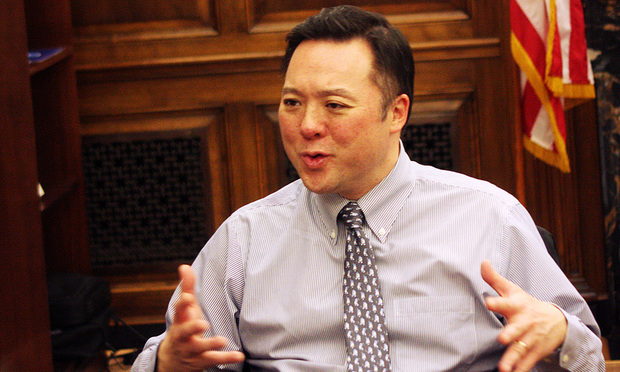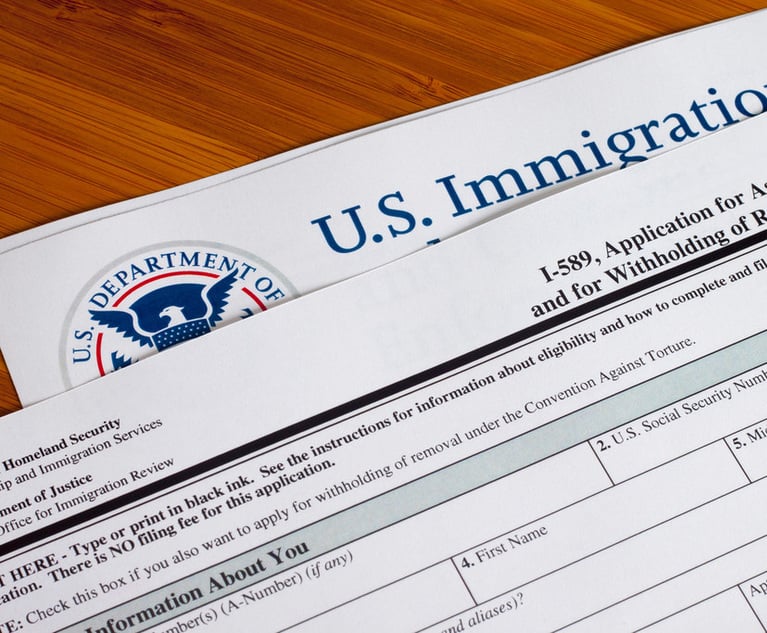Tong Considers Settlement With Purdue Pharma Over Opioid Crisis
Connecticut Attorney General William Tong met in Ohio last week with fellow attorneys general to discuss a possible settlement with Stamford-based Purdue Pharma over the opioid addiction crisis.
August 28, 2019 at 04:48 PM
3 minute read
 Connecticut Attorney General William Tong in his Hartford office in February. Photo: Michael Marciano/ALM
Connecticut Attorney General William Tong in his Hartford office in February. Photo: Michael Marciano/ALM
A spokeswoman for Connecticut Attorney General William Tong has confirmed Tong attended a settlement conference Aug. 22 in Cleveland with other attorneys general related to opioid lawsuits filed against Stamford's Purdue Pharma.
In a statement Wednesday, Tong spokesperson Elizabeth Benton said, "I can confirm that Attorney General Tong was in Cleveland last week as a member of the leadership committee of state attorneys general on the opioid crisis. Connecticut is continuing to aggressively pursue its case against Purdue and the Sacklers [Purdue's owners]."
In a Wednesday statement, Purdue Pharma stated, "While Purdue Pharma is prepared to defend itself vigorously in the opioid litigation, the company has made clear that it sees little good coming from years of wasteful litigation and appeals. The people and communities affected by the opioid crisis need help now. Purdue believes a constructive global resolution is the best path forward, and the company is actively working with the state attorneys general and other plaintiffs to achieve this outcome."
An NBC report Tuesday said the Sackler family, the company's principal owners, planned to give at least $3 billion toward the settlement.
Tong has been among the most vocal of the attorneys general who have filed suit against Purdue Pharma. In April, Tong's office filed an amended 62-page lawsuit against Purdue and individual members of the Sackler family related to the alleged fraudulent transfer of funds from the company. Following an investigation in 2007, several Purdue executives pleaded guilty to charges they misled the public about the risks of their painkiller OxyContin.
Tong's campaign for attorney general last year outlined plans to litigate against Big Pharma over its marketing of opioids.
In an April interview with the Connecticut Law Tribune, Tong called Purdue's actions in marketing its products "some of the more shocking conduct I've seen, and frankly, to borrow a phrase from the U.S. Supreme Court, it shocks the conscience."
Tong said Purdue's marketing of opioids was misleading at best, and said the Sackler family should be held morally responsible, adding the company knew, since at least 2007, about misleading advertising and marketing campaigns related to its products. The attorney general added that he believed the company never properly addressed the issues, making matters worse.
"It wasn't just that they made opioids or sold opioids aggressively, or that opioids are a key part of the addiction crisis," Tong said. "What is really shocking is that knowing all of these facts, Purdue Pharma poured gasoline on the fire."
For its part, Purdue has repeatedly denied ever intentionally misleading anyone through its marketing and advertising campaigns.
A possible settlement with Purdue Pharma comes on the heels of news Monday that an Oklahoma judge ordered Johnson & Johnson to pay $572 million with regard to opioid addiction in that state and the company's role in it.
This content has been archived. It is available through our partners, LexisNexis® and Bloomberg Law.
To view this content, please continue to their sites.
Not a Lexis Subscriber?
Subscribe Now
Not a Bloomberg Law Subscriber?
Subscribe Now
NOT FOR REPRINT
© 2025 ALM Global, LLC, All Rights Reserved. Request academic re-use from www.copyright.com. All other uses, submit a request to [email protected]. For more information visit Asset & Logo Licensing.
You Might Like
View All
Trump Administration Faces Legal Challenge Over EO Impacting Federal Workers
3 minute read
Settlement Allows Spouses of U.S. Citizens to Reopen Removal Proceedings
4 minute read
Trending Stories
Who Got The Work
J. Brugh Lower of Gibbons has entered an appearance for industrial equipment supplier Devco Corporation in a pending trademark infringement lawsuit. The suit, accusing the defendant of selling knock-off Graco products, was filed Dec. 18 in New Jersey District Court by Rivkin Radler on behalf of Graco Inc. and Graco Minnesota. The case, assigned to U.S. District Judge Zahid N. Quraishi, is 3:24-cv-11294, Graco Inc. et al v. Devco Corporation.
Who Got The Work
Rebecca Maller-Stein and Kent A. Yalowitz of Arnold & Porter Kaye Scholer have entered their appearances for Hanaco Venture Capital and its executives, Lior Prosor and David Frankel, in a pending securities lawsuit. The action, filed on Dec. 24 in New York Southern District Court by Zell, Aron & Co. on behalf of Goldeneye Advisors, accuses the defendants of negligently and fraudulently managing the plaintiff's $1 million investment. The case, assigned to U.S. District Judge Vernon S. Broderick, is 1:24-cv-09918, Goldeneye Advisors, LLC v. Hanaco Venture Capital, Ltd. et al.
Who Got The Work
Attorneys from A&O Shearman has stepped in as defense counsel for Toronto-Dominion Bank and other defendants in a pending securities class action. The suit, filed Dec. 11 in New York Southern District Court by Bleichmar Fonti & Auld, accuses the defendants of concealing the bank's 'pervasive' deficiencies in regards to its compliance with the Bank Secrecy Act and the quality of its anti-money laundering controls. The case, assigned to U.S. District Judge Arun Subramanian, is 1:24-cv-09445, Gonzalez v. The Toronto-Dominion Bank et al.
Who Got The Work
Crown Castle International, a Pennsylvania company providing shared communications infrastructure, has turned to Luke D. Wolf of Gordon Rees Scully Mansukhani to fend off a pending breach-of-contract lawsuit. The court action, filed Nov. 25 in Michigan Eastern District Court by Hooper Hathaway PC on behalf of The Town Residences LLC, accuses Crown Castle of failing to transfer approximately $30,000 in utility payments from T-Mobile in breach of a roof-top lease and assignment agreement. The case, assigned to U.S. District Judge Susan K. Declercq, is 2:24-cv-13131, The Town Residences LLC v. T-Mobile US, Inc. et al.
Who Got The Work
Wilfred P. Coronato and Daniel M. Schwartz of McCarter & English have stepped in as defense counsel to Electrolux Home Products Inc. in a pending product liability lawsuit. The court action, filed Nov. 26 in New York Eastern District Court by Poulos Lopiccolo PC and Nagel Rice LLP on behalf of David Stern, alleges that the defendant's refrigerators’ drawers and shelving repeatedly break and fall apart within months after purchase. The case, assigned to U.S. District Judge Joan M. Azrack, is 2:24-cv-08204, Stern v. Electrolux Home Products, Inc.
Featured Firms
Law Offices of Gary Martin Hays & Associates, P.C.
(470) 294-1674
Law Offices of Mark E. Salomone
(857) 444-6468
Smith & Hassler
(713) 739-1250











